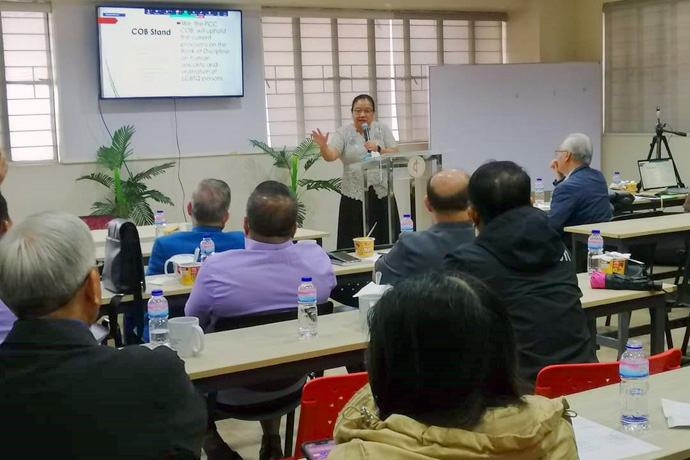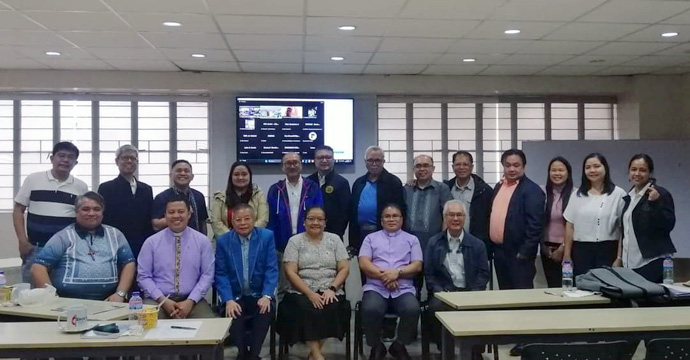
Key Points:
- The Board of the Laity in the Philippines held a forum to seek clarity on compounding church issues and called for autonomy without going through the process laid out in the church’s Book of Discipline.
- The three newly elected bishops in the country, who attended the forum, emphasized their commitment to preserving the unity of the church.
- Bishop Ruby-Nell Estrella of the Manila Area said, “We will study together the regionalization petition to be brought to the 2024 General Conference and seriously revisit the clamor for autonomy from all annual conferences.”
United Methodist lay leaders in the Philippines are calling for the Philippines Central Conference to become autonomous from The United Methodist Church without going through the process laid out in the church’s Book of Discipline.
The call was presented during Board of Laity’s hybrid online and in-person forum Sept. 2 at Knox United Methodist Church in Manila. The gathering was an initial consultation to hear the lay perspective on the future of the church and the upcoming General Conference.
The group did not vote on the matter or file a resolution to send to General Conference, the denomination’s legislative assembly scheduled for April 23-May 3 in Charlotte, North Carolina.
The three newly elected bishops in the Philippines, who attended the forum, emphasized engaging in open dialogue and conversations.
Bishop Ruby-Nell M. Estrella of the Manila Area stood on behalf of the incumbent bishops to present their commitment as episcopal leaders in the country.
“As your newly elected PCC Bishops, we are committed to:
- 1.)Uphold the provisions of the Book of Discipline and the Traditional Plan.
- 2.)We will do whatever we can to preserve the unity of the church.
- 3.)We will undertake the necessary programs of discernment on the best expression of The United Methodist Church in the Philippines. We will study together the regionalization petition to be brought to the 2024 General Conference and seriously revisit the clamor for autonomy from all annual conferences.
- 4.)We call on all United Methodists in the Philippines to continue to pray and remain critical in the information and messaging that you have been receiving from those groups that intend to harm and destroy the UMC.”
Subscribe to our
e-newsletter
She emphasized that if autonomy is the chosen path, “We will go through Paragraph 572.”
Under the Book of Discipline paragraph, when conferences outside the United States desire to become an autonomous Methodist, affiliated autonomous Methodist, or affiliated united church, approval must be secured from the central conference involved and this decision be ratified by the annual conferences within the central conference by two-thirds majority of the aggregate votes cast by the annual conferences. The paragraph lays out a list of steps the central conference must complete.
During the forum, former Chief Justice Reynato S. Puno, a lay leader, called for an immediate declaration of autonomy without going through what he described as a “tedious” process.
Puno noted that more than 6,000 churches in the U.S. have disaffiliated from The United Methodist Church after decades of intensifying debate and defiance over the denomination’s bans on same-sex weddings and “self-avowed practicing” gay clergy. Most of the exiting churches want to maintain bans related to homosexuality.
“(Disaffiliating churches in the U.S.) have been given a speedy exit and UMC Philippines should not be accorded a more tedious way of exit. Freedom of association cannot be based on a unity that is less than voluntary,” Puno said.
He told United Methodist News that it is urgent to move toward autonomy because the issues in the church are creating problems for The United Methodist Church in the Philippines.
“The facts show that UMC Philippines is fast declining in numerals and influence in our jurisdiction. These hydra-headed problems need to be addressed by a UMC Philippines with full autonomy and addressed now. Its attention cannot be distracted by this issue of whether or not to retain the ban on practicing homosexuality or by any other lesser issue for that matter.”
Puno said he believes that the majority of United Methodist churches in the Philippines are against changing the language in the Discipline.
“They embrace the conservative, traditionalist viewpoint that is anchored on the clear teachings of the Bible. Hence, the only way to stop the winds of this schism of UMC Philippines is to follow this traditional viewpoint, which incidentally is reflected even in our current laws and jurisprudence,” he said.
Bishop Israel M. Painit of the Davao Area said a unilateral decision to secede from The United Methodist Church without going through the proper process can have significant implications.
“It may lead to division within the congregations of our churches, legal disputes over property and assets, and strained relationships with other Methodist congregations,” he said. “It’s important for churches to follow established procedures (Paragraph 572 of the Book of Discipline) and engage in open dialogue to minimize potential conflicts and maintain the unity of the faith community.”
Dr. Glenn Roy V. Paraso, the lay leader of the Philippines Central Conference, said that the call to full autonomy would be a significant move.
“(We) should be transfixed with biblical nominations rather than with denominations, which may shift our attention to a name rather than His name, which is what matters.”
He said if the conference would become autonomous, it would “still be deeply connectional in the Wesleyan Methodist sense.”

Paraso said that this expression is yet an iteration of John Wesley's call to biblical consistency and timeless faithfulness, amidst a backdrop of sometimes confusing cultural signals.
Romuel S. Flores, a lay leader from Bulacan Philippines, said if the conference chooses full autonomy, it should negotiate or call exploratory talks with other groups and have one solid and common position on autonomy, especially clergy and deaconesses.
Flores also spoke about how becoming autonomous would affect the conference’s relationship with the United Methodist Committee on Relief and the United Methodist Board of Global Ministries.
“Self-governing would be good for us and a big challenge for us to be more resilient,” he said. “In the framework of the Disaster Risk Reduction and Resilience program strategy of UMCOR, it is enhancing localized action. If before we were being colonized, now we are doing the reverse.”
Reinier R. Puno, a lay leader from Knox United Methodist Church and a member of the organizing committee, said the group’s call for full autonomy isn’t meant to bypass the process laid out in the Book of Discipline but rather follow a less tedious path to separation.
“What we must do is to be solidly united in our focus in declaring full autonomy as a whole Philippines Central Conference and elevate this to the next level,” Puno said.
He said there is an urgency in becoming an autonomous church since United Methodists in the Philippines are getting restless and church membership is decreasing.
Estrella noted that 16 local churches and three mission churches in the Manila Episcopal Area have lost the majority of their members. This represents less than 3% of the 569 local churches in the conference, she said. Thirty-two clergy (including six deaconesses) from the Manila Area have withdrawn their membership from their annual conferences with 15 joining the Global Methodist Church, Estrella said. The theologically conservative breakaway denomination launched last year and has been working to recruit disaffiliating congregations.
Reinier R. Puno said he believes that people in the conference will unite when they see church leaders come together.
“I think once we all unite towards the goal of becoming fully autonomous and people see that our church (and), in particular, our leaders are making major steps towards this goal, people will now be having second thoughts about disaffiliation. … But time is of the essence and hoping and praying that our leaders will act swiftly on this urgent matter,” he said.
Lance Renan De Dios, United Methodist Young Adults Fellowship president, said the call for an immediate declaration of autonomy is untimely, especially without proper process. He said even if the Philippines Central Conference as the highest body can decide on the matter, local churches will be the most affected.
De Dios said that autonomous central conferences are possible but not now.
“The central conference should consider the stability of funding, properties of the PCC, centralization of workers’ salary and consistent programs down to the local churches to strengthen capacities.”
Bishop Estrella encouraged dialogue to continue throughout the central conference around pursuing autonomy while focusing on the mission of the church.
“We strongly encourage everyone to reclaim our identity as people called Methodists, people with warm hearts whose expression of faith in Christ is manifested in works of piety and mercy. Let us revive our passion and consecration to the work of the Holy Spirit in our lives and in our churches. Let us renew our commitment to the mission of making disciples of Jesus Christ for the transformation of the world.
“We will not be pushed back by the negative rhetoric and baseless accusations from pursuing the mission of the church. We will journey together, with the Lord’s leading.”
Mangiduyos is a UM News correspondent in the Philippines.
News media contact: Julie Dwyer, news editor, newsdesk@umcom.org or 615-742-5469. To read more United Methodist News, subscribe to Free Daily or Weekly Digests.



